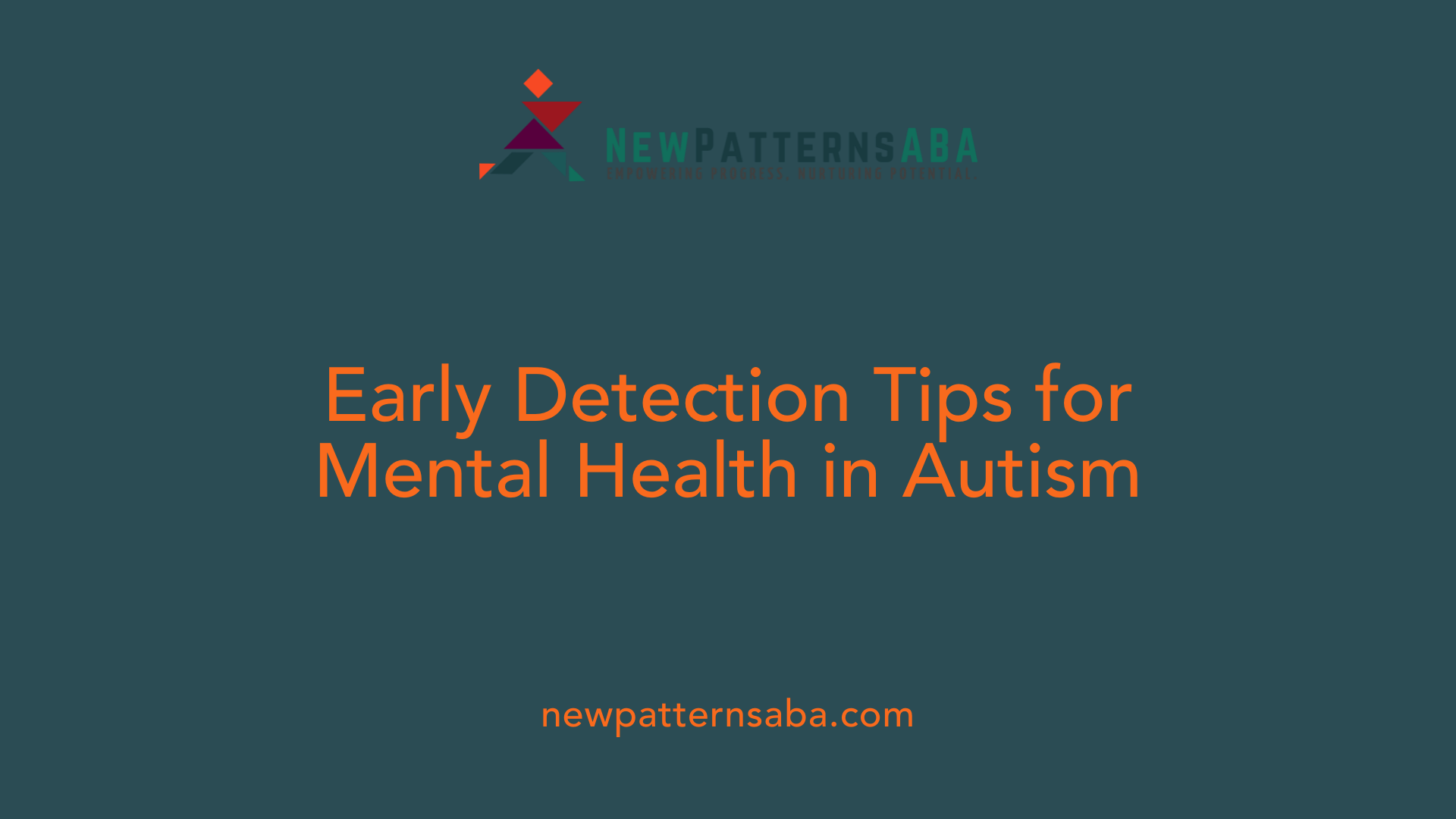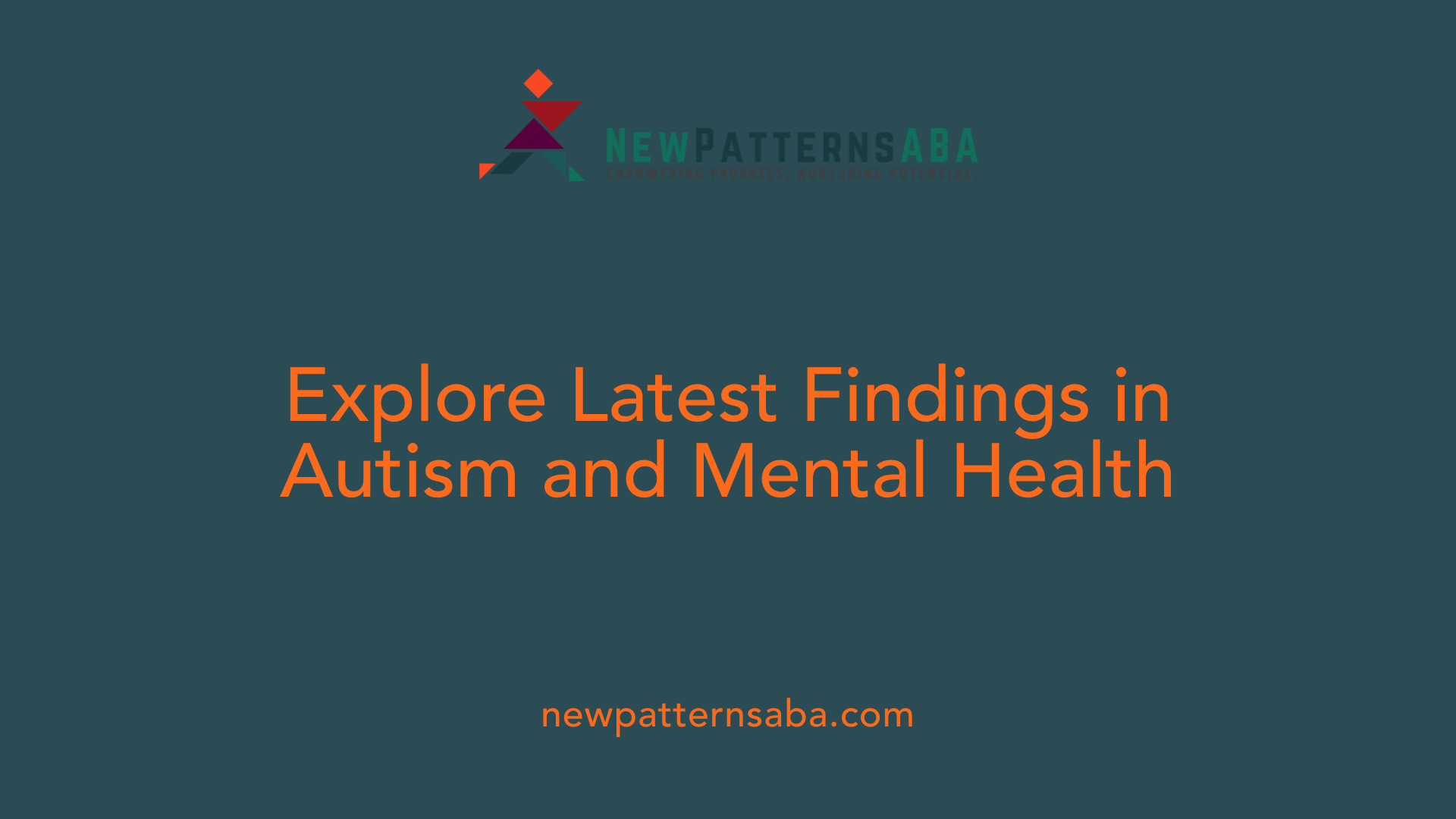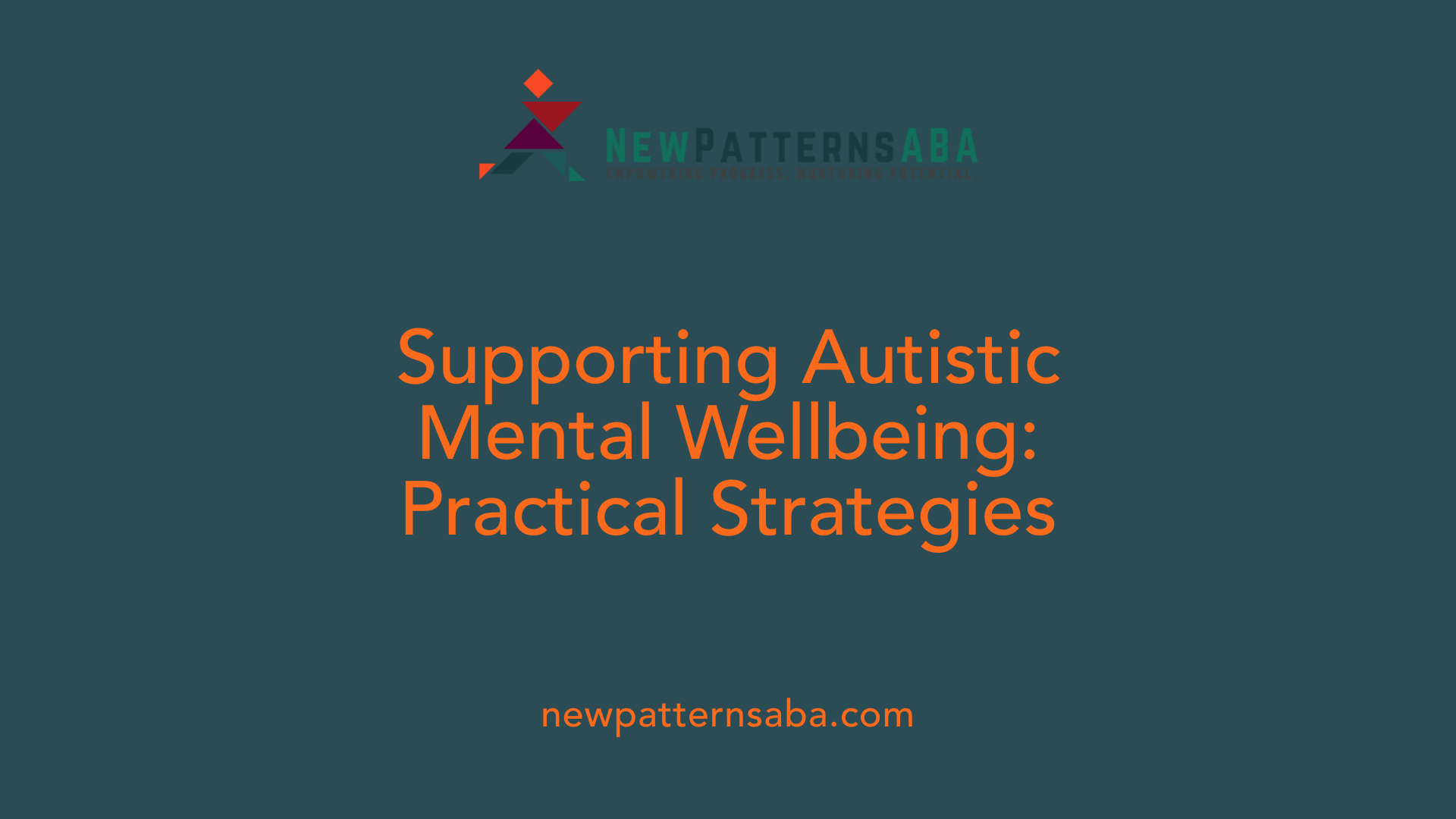Recognizing the Signs and Supporting Mental Health in Autism Spectrum Disorder
Autism Spectrum Disorder (ASD) is a complex neurodevelopmental condition that affects social interaction, communication, and behavior in diverse ways. While core symptoms such as restricted interests and sensory sensitivities are well-known, the high prevalence of co-occurring mental health conditions like anxiety, depression, OCD, and ADHD often remains under-recognized. This article explores how to identify early warning signs of mental health struggles in autistic individuals, understand their unique challenges, and access appropriate resources and support. With nearly 1 in 100 people on the spectrum, understanding and addressing mental health is crucial for improving quality of life and ensuring inclusive support systems.
Signs and Symptoms of Mental Health Issues in Autism
What are the early warning signs and symptoms of mental health problems in individuals with autism?
Recognizing mental health issues early in autistic individuals is crucial for timely intervention. Common signs include noticeable changes in behavior such as increased irritability, withdrawal from social interactions, and episodes of aggression. These behavioral shifts often signal underlying emotional distress or anxiety.
Difficulties with sleep and eating patterns frequently accompany mental health struggles. Autistic individuals may suddenly experience sleep problems like trouble falling asleep or staying asleep, as well as appetite changes, including loss of interest in food or overeating.
A decline in social engagement and reduced eye contact are significant indicators. When someone who previously enjoyed social activities begins to isolate, avoids eye contact, or shows less interest in interactions, it could be a sign of emerging mental health issues.
Communication challenges become more evident as individuals may struggle to interpret social cues or express their feelings effectively. Increased confusion, decreased verbal communication, or atypical speech patterns often occur when mental health problems are present.
Sensory sensitivities or unusual responses to environmental stimuli can also signal distress. For example, an autistic person might become overwhelmed or seek to avoid certain sounds, lights, or textures more than usual.
Persistent repetitive behaviors or rituals, such as strict routines, repetitive movements, or fixation on specific objects or topics, may intensify during periods of emotional upheaval.
Emotional overreactions, like meltdowns or shutdowns, and decreased energy levels are common. These responses often reflect an inability to process overwhelming feelings or sensory input.
Finally, a noticeable loss of interest in activities previously enjoyed—such as hobbies, social outings, or routines—may indicate depression or other mental health challenges.
By being attentive to these signs, caregivers and professionals can implement supportive strategies or seek specialized help. Early detection allows for better management and improved quality of life for autistic individuals.
How Autism Affects Mental Health
How does autism affect mental health?
Autism has a profound impact on mental health, with estimates indicating that around 70% of autistic individuals experience at least one additional mental health condition. Common co-occurring issues include anxiety, depression, obsessive-compulsive disorder (OCD), and attention deficit hyperactivity disorder (ADHD). These conditions often develop as a result of the challenges faced by autistic people in navigating social situations, sensory sensitivities, and environmental stressors.
Autistic individuals may find it difficult to interpret facial cues, tone of voice, or gestures, which can lead to misunderstandings and feelings of social frustration. Sensory sensitivities—such as hypersensitivity to noise, bright lights, or certain textures—can cause overwhelming experiences, contributing to stress and anxiety.
Moreover, delays in diagnosis, societal stigma, and discrimination often compound mental health struggles. Many autistic people feel different from their peers and may struggle with feelings of isolation, worthlessness, or hopelessness. These emotional responses are further intensified when support services are lacking or not tailored to their needs.
Common mental health challenges among autistic individuals include heightened anxiety, especially related to transitions or routine changes, as well as depression stemming from social exclusion or internalized difficulties. Additionally, conditions such as OCD and sleep disturbances are prevalent, impacting overall well-being.
Autism also interacts with other physical health issues like gastrointestinal problems and epilepsy, which can further affect mental health. For instance, chronic pain or discomfort from GI issues may lead to increased irritability and emotional distress.
Addressing mental health in autistic people involves a comprehensive approach, including psychotherapy tailored to their unique experiences, medications where appropriate, and supportive resources that acknowledge the complexities of autism.
Management strategies emphasize building support networks, teaching emotional regulation skills, and creating safe, sensory-friendly environments. Early intervention and consistent care are essential in improving mental health outcomes and fostering resilience.
Efforts in increasing awareness among healthcare providers and the community are vital to reduce stigma and ensure timely diagnosis and support. Recognizing and treating co-occurring mental health conditions effectively can greatly enhance quality of life and enable autistic individuals to reach their full potential.
Common Mental Health Challenges in Autism

What are common mental health challenges associated with autism?
Autistic individuals often face a higher risk of developing various mental health issues compared to the general population. Some of the most prevalent challenges include anxiety, depression, obsessive-compulsive disorder (OCD), and psychosis.
Anxiety is particularly common, with studies showing that up to 70% of autistic people experience some form of anxiety disorder. This can manifest as excessive worry, restlessness, physical symptoms like muscle tension, or avoidance behaviors. Sensory sensitivities and difficulties with social transitions often trigger or worsen anxiety, leading to distress and behavioral challenges.
Depression affects around 20% of autistic adults and a significant subset of children as well. Symptoms can include persistent sadness, loss of interest in activities, changes in sleep and appetite, and feelings of worthlessness. Because of communication barriers, it can sometimes be challenging for autistic individuals to express or even recognize depression, which underscores the importance of attentive support from caregivers and health professionals.
OCD is more common among adolescents and adults with autism, characterized by repetitive behaviors or intrusive thoughts that can interfere with daily life. Unlike typical autism repetitive behaviors, OCD compulsions are often driven by specific fears and anxiety, necessitating careful differentiation during diagnosis.
Psychosis, including conditions like schizophrenia, also has higher prevalence in autistic people. It can involve hallucinations, delusions, disorganized thinking, and difficulties processing reality. Recognizing early warning signs such as social withdrawal, unusual behaviors, or significant changes in functioning is critical for timely intervention.
Beyond these, co-occurring conditions such as bipolar disorder, attention deficit hyperactivity disorder (ADHD), and trauma-related issues are common. Many autistic individuals also experience emotional regulation difficulties, which can lead to meltdowns or shutdowns and impact mental health.
Societal factors play a role too; stigma, discrimination, and challenges in social acceptance contribute to feelings of isolation and vulnerability. Masking or hiding natural behaviors to fit in can be exhausting and lead to burnout.
In addition to neurobiological factors, environmental influences such as adverse childhood experiences, bullying, and victimization can worsen mental health. Primitive coping mechanisms may not be sufficient, necessitating comprehensive, individualized mental health support.
Early detection and tailored interventions—including psychotherapy, medication, and lifestyle adjustments—are vital to improving quality of life. Techniques like Cognitive Behavioral Therapy (CBT) adapted for autistic needs have shown effectiveness in reducing anxiety and managing depressive symptoms.
Addressing mental health concerns in autism requires a multifaceted approach that considers biological, psychological, and social components. Awareness, early intervention, and ongoing support can significantly enhance wellbeing and help autistic individuals lead fulfilling lives.
Resources and Support for Mental Wellbeing
What resources and support options are available for managing mental health in autistic populations?
Supporting the mental health of autistic individuals requires a comprehensive and personalized approach. This involves a combination of therapies, support groups, medications, and tailored educational resources designed to meet individual needs.
Therapeutic interventions such as Cognitive Behavioral Therapy (CBT) are effective in reducing anxiety and depression symptoms, especially when adapted for autistic individuals. Behavioral health services, including sensory integration therapy and social skills training, help improve emotional regulation and social interaction.
Support groups are valuable for both autistic adults and caregivers. They provide a platform for sharing experiences, gaining peer insights, and reducing feelings of isolation. Organizations like the National Autistic Society and Autistica offer online communities, webinars, and resources aimed at fostering resilience and understanding.
Medication can play a role in managing co-occurring conditions such as anxiety, depression, OCD, and ADHD. For example, SSRIs are commonly prescribed to help alleviate anxiety and mood disorders. It is important that psychiatric treatment is individualized and closely monitored by healthcare professionals.
Addressing physical health issues is also crucial. Gastrointestinal problems, which affect a significant proportion of autistic individuals, can contribute to emotional distress. Dietary modifications, microbiome therapies, and medical management of GI symptoms can improve overall mental wellbeing.
Educational resources tailored to autism, like visual stories and social narratives, support understanding and coping strategies. These tools help individuals recognize their emotions, develop resilience, and navigate social environments more effectively.
Community-based interventions, including inpatient programs and specialized autism centers, provide intensive support when necessary. These programs offer personalized interventions that focus on emotional health, skill development, and sensory needs.
In addition, promoting family education and caregiver support is vital. Resilience-building strategies, psychoeducation, and training on recognizing early signs of mental health issues empower families to seek timely help.
Collaboration among healthcare providers, mental health specialists, educators, and community organizations ensures a holistic approach to wellbeing. Access to these resources enhances the quality of life for autistic individuals and fosters their mental health stability.
Resources and Support Options at a Glance
| Support Type | Examples | Description |
|---|---|---|
| Therapy | CBT, sensory integration, social skills training | Customized therapeutic approaches to manage anxiety, improve social skills, and emotional regulation |
| Medication | SSRIs, antipsychotics | Pharmacological support for co-occurring mental health conditions |
| Support Groups | Online communities, local groups | Peer support for sharing experiences and reducing isolation |
| Educational Resources | Visual stories, social narratives | Tools to aid understanding of emotions and social cues |
| Medical Interventions | Gastrointestinal management, microbiome therapies | Address underlying health issues affecting mental health |
| Specialized Programs | Autism centers, inpatient support | Intensive intervention tailored to individual needs |
| Family and Caregiver Support | Psychoeducation, resilience programs | Training and resources to support ongoing mental health needs |
More Information and How to Search for Support
To find relevant support for mental health in autism, search using queries like "support mental health autism" or explore resources provided by reputable organizations such as the National Autistic Society, Autistica, and Ambitious about Autism. These organizations offer comprehensive guides, research updates, and programs designed to foster wellbeing and resilience within the autism community.
Effective Strategies for Recognizing and Understanding Mental Health Issues

What strategies help in identifying and understanding mental health issues within the autism spectrum?
Recognizing mental health challenges in autistic individuals requires a combination of specialized screening tools and observational skills. Autism-specific screening instruments like the Autism Spectrum Quotient (AQ), the Ritvo Autism and Asperger Diagnostic Scale-Revised (RAADS-R), and the Autism Spectrum Disorder—Diagnostic Framework (ASD-DF) are valuable for early detection. These tools assist clinicians in flagging individuals who may need comprehensive assessments, streamlining the diagnosis process.
In addition to standardized tests, close observation of behavioral and emotional changes is vital. Warning signs include increased self-injury, aggressive behavior, heightened anxiety, sleep disturbances, or withdrawal from social activities. Such signs often indicate underlying mental health issues like depression, anxiety disorders, or mood swings.
Training clinicians, educators, and caregivers is crucial to improve early detection. When those responsible understand autism-specific symptoms and can differentiate normal developmental variations from concerning signs, they can act more swiftly. This training enhances awareness about triggers and behavioral cues that may point to mental health struggles.
To complement screening and observation, the development of specialized assessment instruments has been underway. One such tool is the Mental Health Crisis Assessment Scale (MCAS), a research-based instrument designed to evaluate the severity of psychiatric crises specific to individuals on the spectrum. Although still primarily used in research settings, the MCAS aims to standardize crisis evaluation and guide appropriate interventions.
Building awareness within communities and among healthcare professionals fosters an environment where self-advocacy is supported. Educating autistic individuals about their mental health and encouraging open discussion can lead to earlier identification of issues and more tailored support.
Tailored assessments, combined with ongoing education and improved accessibility to mental health services, ensure that mental health issues are recognized promptly. Early detection then paves the way for effective interventions, which are crucial for improving quality of life and reducing the severity of mental health challenges in the autism community.
In summary, a comprehensive approach involving autism-specific screening tools, vigilant observation, professional training, specialized assessment instruments, and increased awareness forms the foundation for effectively detecting and understanding mental health issues within the autism spectrum.
Current Research and Advances in Autism and Mental Health

What are the current research findings regarding mental health and autism?
Recent studies show that mental health issues are extremely common in autistic individuals. Nearly 78% of autistic people experience at least one mental health condition during their lifetime. Common co-occurring issues include anxiety, ADHD, depression, and behavioral problems. For example, research indicates that autistic children are four times as likely to face depression compared to their neurotypical peers, with over 40% affected by anxiety disorders. This highlights the substantial mental health challenges faced by the autism community.
Advances in research are focusing on early detection and screening tools. Video-based assessments, eye-tracking technologies, and genetic studies are making it easier to identify autism and related mental health concerns earlier in life. Early diagnosis is crucial because it allows for timely intervention, which can improve long-term outcomes.
Biological and behavioral research is uncovering more about the causes and progression of mental health issues in autism. Studies suggest that genetic factors and neurobiological differences play a significant role, and environmental influences like prenatal exposures may also contribute. Longitudinal research—studies that follow individuals over time—shows that mental health symptoms can fluctuate and are affected by many factors, including adaptive skills, peer relationships, and family environment.
Furthermore, this research emphasizes the importance of integrating mental health services into autism support programs. Early screening combined with personalized interventions can make a big difference, helping autistic individuals lead healthier, more fulfilling lives. Tailoring support to individual needs and developmental stages is a growing focus, ensuring that mental health care is effective and accessible.
In summary, current research is transforming our understanding of autism and mental health. Improved detection methods, deeper insights into biological factors, and a focus on early, personalized care are paving the way for better support systems and improved quality of life for autistic individuals.
Understanding the Impact of Societal and Environmental Factors
How do societal attitudes and environments influence mental health in autism?
Societal views and the environments in which autistic individuals live greatly influence their mental health. Negative attitudes, stereotypes, and discrimination can lead to feelings of alienation and low self-esteem. When society perceives autism through misconceptions or stigma, it often results in social exclusion, making everyday interactions and integration more difficult.
Environments that are not adapted to meet the sensory and social needs of autistic people can intensify feelings of overwhelm and frustration. Schools, workplaces, healthcare settings, and public spaces may overlook the need for sensory accommodations or inclusive practices, adding to daily stress.
Many autistic individuals adopt masking, which involves concealing their natural behaviors and adjusting to societal expectations to avoid judgment or rejection. While masking might provide short-term social acceptance, it is mentally taxing and can lead to exhaustion, emotional fatigue, and burnout. This ongoing effort to hide their true selves diminishes their wellbeing.
Addressing these societal barriers requires concerted efforts, including increasing awareness about autism, promoting acceptance, and creating autism-friendly environments. Policies that foster inclusion and understanding, alongside public education campaigns, are vital to reducing stigma. Building supportive and inclusive spaces allows autistic individuals to express themselves freely, improving mental health and overall quality of life.
Recognizing the importance of societal impacts informs a broader approach to supporting autistic individuals, emphasizing the need for respect, understanding, and adaptable environments that cater to diverse sensory and social needs.
Practical Tips and Tools for Supporting Autistic Individuals’ Mental Health

How can caregivers and professionals support mental health in autistic individuals?
Supporting mental well-being in autistic individuals involves a combination of personalized strategies and empathetic understanding. Establishing predictable routines is fundamental, as routines can reduce anxiety and provide a sense of stability. Visual supports, social narratives, and other communication tools help clarify expectations and facilitate better understanding, especially for those with delayed or nonverbal communication skills.
Sensory-friendly environments are equally important, as overstimulation can lead to distress or meltdowns. Adjustments like noise-canceling headphones, designated quiet spaces, or calming sensory activities can create a safe space for calmness and self-regulation.
Encouraging self-advocacy enables individuals to understand and express their emotions and needs. This empowerment fosters resilience and confidence, helping them navigate social situations and manage stress.
Building strong support networks is essential. Families, friends, educators, mental health professionals, and peer groups form an interconnected web that offers guidance, validation, and assistance. Regular monitoring of behaviors and emotions allows for early detection of mental health issues, leading to timely interventions.
Tailored therapeutic approaches such as Cognitive Behavioral Therapy (CBT) are effective in managing anxiety and depression in autistic individuals. Additionally, resources like the Molehill Mountain app provide practical tools for anxiety management.
Organizations such as the National Autistic Society, Autistica, and Ambitious about Autism offer valuable resources, training, and community support.
In summary, a personalized approach rooted in understanding, patience, and empathy, combined with practical tools and supported environments, fosters resilience and promotes positive mental health outcomes. Regular communication, self-advocacy, and the strengthening of support networks are cornerstones in supporting autistic individuals’ mental well-being.
Moving Toward Better Support and Awareness
Recognizing and addressing mental health struggles in individuals with autism is a vital step toward fostering inclusive, supportive communities. Early detection of warning signs, understanding the complex interplay between autism and mental health, and utilizing available resources can significantly improve outcomes. Reducing societal stigma, creating autism-friendly environments, and empowering individuals through education and tailored interventions are essential for promoting mental well-being. Continued research and increased awareness will help remove barriers, ensure early intervention, and create a society where autistic individuals feel understood, supported, and valued. By working together, caregivers, professionals, and communities can build pathways to resilience, healing, and a more inclusive future.
References
- Autism and mental health
- Autism Spectrum Disorder - National Institute of Mental Health (NIMH)
- Identifying and Addressing Mental Health Issues in Autistic Individuals
- Autism | National Alliance on Mental Illness (NAMI)
- Autism and Co-occurring Conditions in Children
- Signs that a child or adult may be autistic
- Awareness, Education, and Counseling: Supporting mental health ...
- Autism and Mental Health | Advice for young people | YoungMinds
- Medical conditions associated with autism | Autism Speaks





